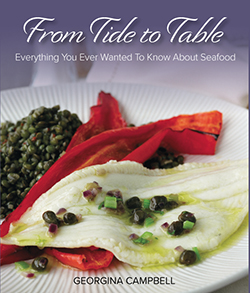- About ▼
- Awards
- Eat
- Drink
- Stay
- Buy
- Learn
- Producers
- 10 of the Best ▼
- Articles
- Blog
- Recipes ▼
- Special Offers
- Competitions
- Shop
- Recipe Cards
- Buy Guidebooks
- Buy Cookbooks
- GPS POIs for Garmin
- « Ireland Apps ▼
- « Cooking Apps
- iCook - Recipes & Cooking with Neven
- APPetiser - Recipes & Cooking with Derry Clarke
- For the Love of Food – Kevin Dundon
- More+ ▼
Grow It Yourself - April
 The luck of the crop rotation draw and bad design in my veg patch means that particular veg families tend to have what might be described as ‘off years’ depending on the area they are destined to spend their growing season in.
The luck of the crop rotation draw and bad design in my veg patch means that particular veg families tend to have what might be described as ‘off years’ depending on the area they are destined to spend their growing season in.
There’s a particular part of my veg patch that is hampered by being simultaneously the closest to the garden perimeter and the lowest point in the garden. Thanks to the shading from the aggressive hawthorn hedge nearby, it gets less light than the other parts of the patch. And since it is comparatively low-lying, lazy frosts also converge there, slumping in from all parts of the garden. They could happily hide out there from the sun’s rays until lunchtime, and I’ve seen occasions when they’ve got to stay there for days on end.
If all that weren’t bad enough, the beds there also suffer from the attentions of the always-encroaching ditch, with errant briars going out in search of nutrient rich soil. The grass that surrounds the vegetable garden also tries to make its way in to the veg patch through the picket fence. In high season it’s a constant battle to keep the beds near the fence clear.
None of this, as you can imagine, is particularly helpful to the vegetables growing there and I always feel bad for whatever family is due a visit there. This year it’s the turn of allium family to do a turn and so I am already mentally bracing myself for a poor crop of garlic, onions and leeks this year.
I could of course try moving the entire vegetable patch about 10m further away from the garden perimeter and closer to the house. This would, however, take up 10m more of lawn and I think I have already pushed that particular boat as far as is acceptable to the rest of the family.
So I have learned over the years to bear this particular problem with stoicism and I like to think the veg families do too. So, yes, once in every five years, they have an ‘off’ year. But sure doesn’t that make the other four years all the sweeter?
 Things to do this Month - April
Things to do this Month - April
To Do
If poor weather in March has hampered your outdoor work, then April is the month to catch-up. The key words for April are weeds and slugs. You need to stay on top of them both. Check your early spuds regularly and ‘earth-up’ as required. Water your tunnel/greenhouse – things can get pretty warm on a nice sunny April day and seedlings will dry out quickly.
Sow
Indoors: lettuce, tomato, pepper, chilli-pepper, cucumber, celery, celeriac, basil, leeks, cabbage, cauliflower, Brussels sprouts, parsley, courgette, marrow, globe artichoke, beans, sweet corn and pumpkin. Outdoors: broad bean, onion sets, pea, beetroot, cabbage, spinach, Brussels sprouts, parsnip, spring onion, leek, carrot, radish, broccoli, turnip. Plant out cabbage plants when they are 15/20 cm tall into well prepared soil that has been manured.
Harvest
Stored fruit and vegetables are likely to be a distant memory at this stage and new crops are only starting to trickle in which makes April a tricky proposition. The middle of this month might see the first asparagus and the first early spring cabbage. The other two star performers this month are purple sprouting broccoli and rhubarb.
Recipe of the Month – Deb’s Kale Salad with Apple, Cranberries and Pecans
I made a big batch of this last weekend and enjoyed it for lunch several days running. It’s delicious. I didn’t have any radishes, but it didn’t seem to suffer too badly from their omission. Come to think of it, I also didn’t have pecans and used walnuts instead.
The recipe (from The Smitten Kitchen cookbook) recommends Cavolo Nero kale (don’t they all) but you can use whatever you have – mine was the hardy red kale, Redbor.
Serves 4.
Ingredients:
• 50g pecans
• 200g kale
• 4 to 5 medium radishes
• 50g dried cranberries
• 1 medium apple
• 50g soft goats cheese
For Dressing:
• 3 tablespoons olive oil
• 1½ tablespoons apple cider vinegar (or white wine vinegar)
• 1 tablespoon smooth Dijon mustard
• 1½ teaspoons honey
• Sea salt and freshly ground pepper, to taste
Directions:
Preheat the oven to 180 degrees celsius and spread the pecans on a baking tray. Toast them until lightly golden, about 5 to 10 minutes, tossing them once or twice to make sure they bake evenly. Remove the tray from the oven and set them aside to cool.
Pull the kale leaves off from the tough stems and discard the stems. Chop the kale into small, bite-sized pieces. Transfer the kale to a big salad bowl. Sprinkle a small pinch of sea salt over the kale and massage the leaves with your hands by lightly scrunching big handfuls at a time, until the leaves are darker in color and fragrant.
Thinly slice the radishes and add them to the bowl. Coarsely chop the pecans and cranberries and add them to the bowl. Chop the apple into small, bite-sized pieces and add it to the bowl as well. Crumble the goat cheese over the top.
In a small bowl, whisk the dressing ingredients together and pour the dressing over the salad. Toss until the salad is evenly coated with dressing.
Serve immediately, or for even better flavour, let the salad marinate in the dressing for 10 to 20 minutes beforehand.
Tip of the Month – Picking Onion Sets
Onion sets are small, immature onions, planted in spring or late summer. The sets increase in size and each forms one full-sized bulb when ready to harvest. Its much easier to grow onions from sets than it is from seed but they have the downside of being more expensive than seed.
A poor onion set equals a poor onion. With that in mind we should only sow the best quality onion sets otherwise we will get a poor harvest. Sow good hard, plump ones - never very small or soft ones. Some, but not all, garden centres offer sets for sale in open trays so you can literally pick out the best ones. Sets can be planted in the soil this month, weather permitting.
About GIY
GIY is a not-for-profit organisation that aims to create a healthier, more sustainable world where people grow their own food. We inspire and support people to grow food more successfully by bringing them together to share advice, tips and ideas. There are approximately 50,000 people involved in the GIY movement in Ireland, which is proudly supported by Woodies DIY.
For more information check out www.giyireland.com
Michael Kelly is a freelance journalist, author and founder of GIY Ireland.
© GIY Ireland 2014 – all rights reserved.






There are currently no comments
Leave a comment
Not a member? Register for your free membership now!
Or leave a comment by logging in with: